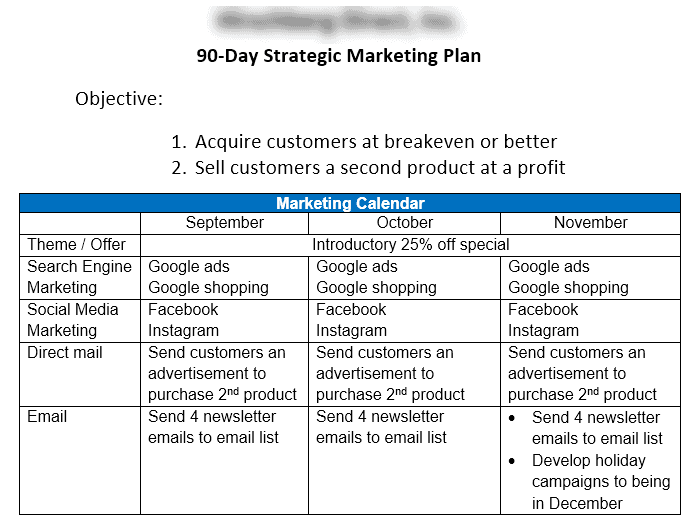The Five Most Important Decisions in International Marketing
If you are looking to another country to expand your sales and marketing efforts, you have come to the right […]
Read More »Become a successful marketing consultant: Learn more

Marketing is one portion of your business that you have complete control over.
You know your business, products, services and skills better than anyone else. And doing your own marketing guarantees that you will communicate to your chosen audience the way you want.
When you do the job yourself, you don't have to pay a third party which keeps you in control and your costs down. And in the beginning phases, it is absolutely crucial that you nail down the most important part of the marketing plan and clearly define:
Who the customer is and why they should choose you
But the hard part for many fast-moving entrepreneurs is finding the starting point.
The following steps will help you get started and make it easy for you to develop a super successful marketing plan.
As an entrepreneur who is trying to make money, your marketing plan doesn’t have to be complicated.
After all, marketing is very simple. The only job of marketing is to:
1) gain a customer, and
2) keep a customer.
Nothing else matters. And especially in the beginning of your business
you need customers
Depending upon the phase of your business, your marketing plan simply shifts between priority of resources allocated to either gaining or keeping customers.
In the beginning, 100% of your resources go towards acquiring customers. 0% of your resources are focused on retaining customers. As you acquire a customer base, resources shift to keeping your customers, too.
Regardless of where you are with your business, whether a startup or doing $1,000,000+ a year in sales revenue...
Your marketing plan starts with these four primary factors:
Once you have the answer to these four questions, you can begin to document a marketing plan.
While it’s very easy to get complicated and think you need many documents, explanations, topics, apps and tools to draft a marketing plan, in reality you don’t.
And oftentimes, the more you complicate things, the slower you go, the more time and money spent, added planning and documentation costs, and less things actually get to market.
But you need to do your research. Doing research is simply part of the job. You must ...
An entrepreneurial marketing pro leans on the legal team, the accounting department and the administration to ensure messaging, budgeting and paperwork are in order.
But marketing needs to stay lean, agile and move fast.
That’s because markets and customer tastes change quickly. In fact, the most efficient way to keep sales revenue high and the bills paid (to pay for legal, accounting and admin) is to be aggressive in sales and marketing campaigns.
Onward.
A marketing plan for an entrepreneur has these four main components:
Here’s the job of each component:
The marketing calendar lays out the schedule for the marketing activities. We typically look 90 days out and detail the activities on a daily, weekly or monthly basis. For promotions that require a longer development time, we simply add the actions items within our calendar to keep us focused on what actions we need to take. The calendar is often in a google or word doc or in a google calendar and is reviewed daily and always updated. The entire team is 100% aware of the calendar.
Keep it simple, for example:
 The budget is in union with the calendar. The importance of the budget cannot be overstated because it sets the framework for the scope of the marketing campaign and is in union with the KPI’s. The marketing budget is usually in a Google sheets or Excel file and often tied to the calendar of marketing activities.
The budget is in union with the calendar. The importance of the budget cannot be overstated because it sets the framework for the scope of the marketing campaign and is in union with the KPI’s. The marketing budget is usually in a Google sheets or Excel file and often tied to the calendar of marketing activities.
A project management system has many options. The important part here is that you have a system to manage all the activities needed to effectively manage the calendar of activities and the budget. This system can be a person, an app, the whole team or department, or anything else.
Key Performance Indicators (KPIs) in marketing is the fun part! But extremely important. Think of KPIs as the scorecard. It’s also how marketing keeps advertising accountable and the sales department making productive sales (more about this in another tutorial). While the SEO team has 143 extremely important KPI’s in mind-numbing reports that must be shared weekly (yes, a little pun), in reality, the most important KPIs are the needle movers that contribute the most to making profitable sales revenue. Go here for a detailed explanation of important KPIs in marketing.

Legendary success coach, Brian Tracy, sums it up best…
Success is goals and all else is commentary.
It's been said that marketing is just like hitting a moving target.
But regardless, a marketing plan must have a target.
Marketing goals are best set knowing the KPIs.
In many cases, either the entrepreneur is just getting started and has no KPIs yet (no record of cost per sale, cost per lead, sales revenue targets per source, etc) or the entrepreneur has been so busy managing the business, they just haven't had time to define their KPIs, let alone measure them.
This is more common than you might think and why Your Strategic Marketing Partner is in business -- to serve busy entrepreneurs who want to reach $1,000,000 in sales revenue and then scale past this benchmark.
Short term and long term marketing goals are essential:
For example, let's assume your first short term goal is to generate $10,000 in sales revenue from a product you sell for $100.
As you know, the basic first goal is to sell 100 units.
But of course, you need to make a profit, so assuming you make a net income of $20 on each sale, the goal gets a little more complex.
If your goal is to make $1,000 in net income, your goal is to sell 50 units in order to make $5,000 in sales revenue to realize $1,000 in net income.
But now, in order to set short term and long term marketing goals, we need to factor in an important marketing KPI: cost per sale (CPS).
With this, you can now set short term goals, learn to scale up sales and set some long term goals. And the beautiful thing about marketing is that when marketing is done properly and you successfully test small, chances are great that you can scale big!
For example, here is a short term goal: Make $1,000 in net income:
Long term goal: Make $100,000 net income
You see, short term and long term marketing goals work in union.
Knowing your KPIs are core to your goal planning process.
But before you can do that, you need to dial in your marketing plan. And before you can dial in your marketing plan you need to go full circle with your initial research:
If you need assistance along the way, Your Strategic Marketing partner is happy to help!
About Your Strategic Marketing Partner
Sam Hirschberg, MBA, is Your Strategic Marketing Partner in Arizona. Always professional and a delight to work with, Sam is not your typical “marketing consultant”. Unlike most consultants who tell you there is a problem and say, “See you later and good luck!” Your Strategic Marketing Partner knows how to find solutions, execute programs, test and measure campaigns, and how-and-when it’s time to roll-out big! You are invited to call (602) 892-0777 to learn more about Sam’s background on his FREE 9-minute recorded message. For more information about Sam, please visit https://strategicmarketingpartner.com.